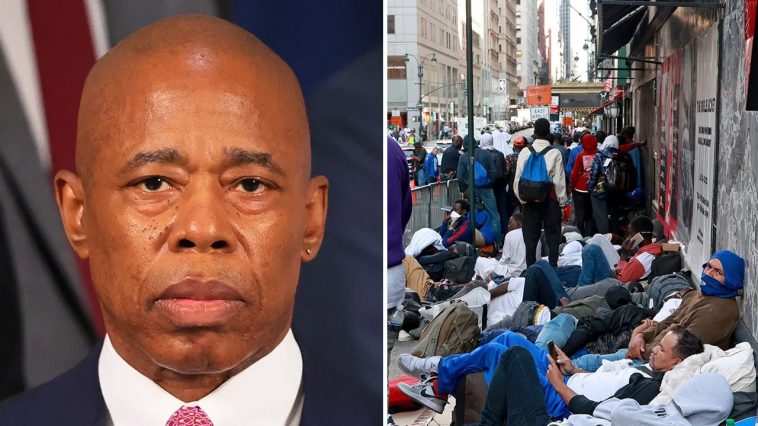LISTEN HERE:
In the midst of the ongoing migration issue, municipal leaders hailing from New York City, Chicago, and Denver turned to the Biden administration on Wednesday, appealing for fortified aid to manage the intricate scenario within their jurisdiction.
The city leaders, overseeing sanctuary cities, conveyed their concerns to the White House and Congress, urging them to consider sanctioning working permits for the immigrants, along with introducing supplementary financial support. Moreover, they have encouraged enhanced collaboration between the multiple layers of government – state and local.
The cities have welcomed an unparalleled number of immigrants over time; New York City has now become home to approximately 160,000 migrants, Denver to over 34,000, and Chicago to more than 30,000.
According to Brandon Johnson, the Mayor of Chicago, the mission has currently entered a critical phase, requiring immediate interventional measures. Without these necessary actions, he recognized that the local economies were not adequately equipped to cope with this type of crisis. Amidst the ongoing predicament, the system is being constructed on the go, further intensifying the situation.
Recent federal reports have reflected an upsurge in illegal immigration attempts at the southern border, consistently breaking previous records. The data, recently released by the Daily Caller News Foundation, stated that the number of migrants detained each day had surged past 20,000, exceeding the available capacity.
This influx has created a logistical strain on the resources particularly since in the fiscal year 2023, the Border Patrol has registered interactions with more than 2 million migrants illegally crossing the southern border, according to data from CBP.
Denver Mayor, Mike Johnston, alerted that without federal support, a coordinated effort, and work authorization, municipalities would have to reassess their current model of service provision or resort to drastic alterations in city budgets. The reality is becoming more apparent every day and seems to be leading towards a path of financial uncertainty for local governments.
Echoing Johnston’s concerns, New York City Mayor Eric Adams highlighted the ongoing strain on city resources due to a consistent influx of immigrants, despite previously announcing a 5% budget cut across all city services. He indicated that the city had been able to conceal the extent of the crisis for several months, but the continuous wave of enormous amounts of migrants has brought them to a breaking point.
Leaders of these cities have also been focusing their efforts to counteract the migrant transport measures implemented by Texas Governor Greg Abbott, a Republican. With an executive order in place, Mayor Adams has initiated restrictions on buses and made it mandatory to be notified of their arrivals. In parallel, Johnston mentioned that Denver was also imposing restrictions on the transport of migrants.
Mayor Johnson of Chicago has taken things a step further by starting to confiscate buses that did not comply with certain regulations, including providing a 48-hour notice prior to arrival. As Johnson pointed out, the Governor of Texas’ actions seem to have prompted aggressive measures in retaliation against the cities’ collective effort to establish a coordinate system.
Abbott, the Texan Governor, responded to Mayor Johnson’s ordinance by initiating the process of flying migrants directly to Chicago. He was moved to comment that ‘Sanctuary city Chicago started obstructing and targeting our busing mission. Texas will now expand our operation to include flights to Chicago.’ His statement clarified the decision, underscoring the state’s move to adapt to the changing circumstance.
The Governor’s statement concluded with a call for the Biden administration to firmly secure the border. Until that happens, he promised to continue extending assistance to Texas border towns that were bearing the brunt of the influx. Abbott’s commitment seems to be providing an alternative remedy, channeling relief to these overwhelmed communities until a more durable, federally supported solution can be enacted.
As an illustration of the mounting concerns, the Mayors reported that they’ve been left with little choice but to implement such measures, considering the lack of sufficient federal assistance. They noted that coordination and city calibrations are necessary to ensure smooth operations, but the lack of these elements has only amplified problems.
For now, cities are focusing on ways to strike a precarious balance, managing the influx of immigrants within the scope of their current resources and capacities. However, all of this only underscores the pressing need for federal assistance and workable strategies to navigate the larger issue of migration.
As it appears, the Mayors’ call for help places them, and their cities, at the center of a dynamic and sensitive national debate. Their cities now serve as active grounds for illustrating the human dimensions of the migration issue, as they are expected to accommodate and manage thousands of new arrivals each day.
This escalating situation is a stark reminder of the immense pressures that local governments are grappling with due to large-scale migration. Without federal support and a coordinated effort among different governmental levels, the ability for these cities to maintain service quality is coming under severe strain.
In an ideal scenario, these Mayors maintain hope for a coordinated and comprehensive solution from federal government. One that would provide work authorization to immigrants, preventing a dramatic decrease in services or severe cuts in city budgets. As it stands, they are caught in a precarious situation, managing increasing pressures with limited resources.
In conclusion, this situation calls on the federal government to step up and take decisive steps to address the immigration crisis. Issues of such scale should ideally involve robust intervention from all levels of government. It remains to be seen whether the government will heed the call and respond positively to secure America’s borders, all the while ensuring the lives of people in border towns get much-needed relief and support.


